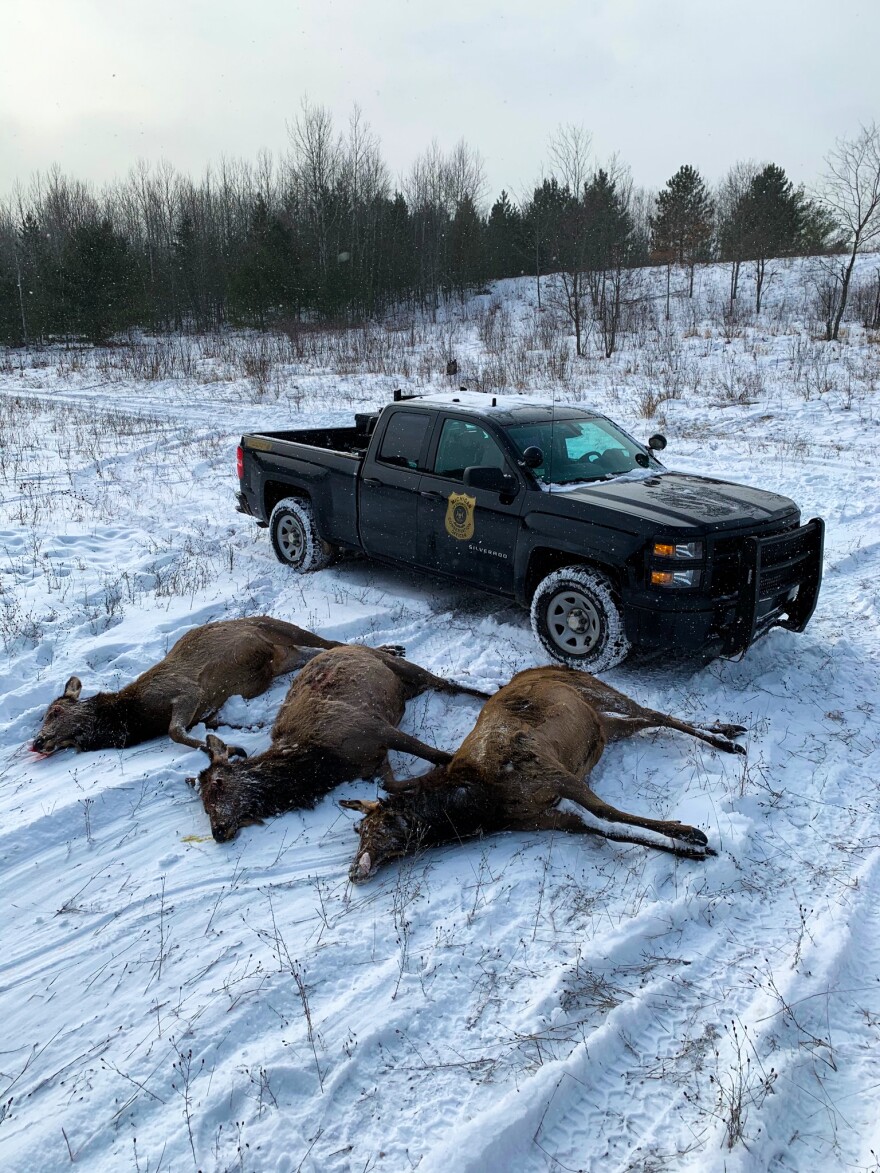Last month, three more elk were poached in the Pigeon River State Forest.
It was the latest in a series of elk poaching that has made the past few months some of the worst in recent memory for Michigan’s elk herd.

On a a sunny winter afternoon deep in the Pigeon River State Forest, Michigan DNR officer Matt Theunick hikes his way to the spot where three cow elk were recently poached.
“This is the sight of the first animal,” he says, pointing. “It was laying here on the ground.”
You can still see pinkish-red snow, where blood pooled after the elk was shot.Theunick says the other two elk were found about 50 and 100 yards away from this first one.

“I’ve had lots of people from the public say, ‘Why would somebody do that?’ I don’t know,” he explains. “I’m hoping to find out when we eventually catch these people.”
Over the past three months, eight elk have been poached in northern Michigan.
But the DNR says the real number of poaching cases is likely two to three times higher than what’s known.
And because the elk habitat is so large, only so many of them are ever discovered.
In three of those poaching cases, hunters shot the animals on accident and turned themselves in.But in the other five cases, the elk were shot and just left to rot.Usually by the time the DNR finds them, it’s too late to salvage any of the meat.
“It’s just a pure waste of an animal,” says Sarah Doan, who serves local huntersat the Elk Horn Grill and Tavern in Vanderbilt.
Doan says most of the people she talks to are disgusted with the poachings.
“People are upset,” she says. “It’s not a trophy, nobody’s being fed. It’s not something that can be donated to a food pantry or anything after the fact.”

Michigan has a long history with elk.Before the state was established, a species of eastern elk roamed the land. As Europeans settled the region, those elk were over-hunted and eventually wiped out.
But in 1918, elk were reintroduced to the state from Yellowstone National Park.Three separate herds were released in northern Michigan.Two of those herds were again wiped out, but the third one – a herd south of Wolverine in the Pigeon River Country – survived and are the reason Michigan has elk today.
The DNR says the reason that herd survived while the others didn’t, was because the Pigeon River Country community really took pride in the animals.
“The predators were non-existent except for humans,” says DNR biologist Brian Mastenbrook. “The people must have just protected them more.”
That support continues as today, Michigan’s elk herd sits at around 1,200.
“We’re the only place in Michigan that has it and it’s something that is special to us,” says Ryan Lucas, a hunter from Gaylord. “So yeah, we do kind of protect it and appreciate [the elk].”
So why the unusually high number of elk poachings this year?
Meredith Gore, a conservation social scientist at Michigan State University, says the answer is complicated.
“It’s possible that people might be doing this for the thrill or because they’re bored, or because they’re trying to do some sort of gamesmanship,” she says.
Gore also looks at any related policy or regulatory changes – like the controversial deer and elk baiting ban enacted last year.Then last month when state lawmakers passed legislation to reverse the ban, Governor Gretchen Whitmer vetoed it.
Gore says all of that is something to keep in mind.
“Sometime people retaliate as a form of rebellion,” she says. “It’s almost like a form of civil disobedience if you will.”
That’s the theory Jim Ormsbee is going with. He’s an elk hunting guide out of Vanderbilt.Ormsbee thinks people are frustrated and trying to send a message to the state.
“I think this is just kind of a little repercussion to say, ‘Hey, you ain’t gonna let us bait, you ain’t gonna let us feed the deer’ … I think this is a message saying, ‘Hey!’ That’s what I think.”

Mark DePew is a sergeant with the DNR in Gaylord. He says whatever the motivation for poaching, it doesn’t really matter.
“They’re stealing from everybody in this state,” he says. “Those animals belong to us and we need to take care of them.”
DePew says because everybody is talking about these poachings and a one-thousand dollar reward was recently offered, he’s confident they’ll catch whoever did this.
“People usually just can’t keep this quiet,” DePew says. “They’re going to tell somebody, whether it’s one day, two years from now, they get intoxicated and … somebody hears something.”
Anyone with information on the elk poachings can call the DNR District Office in Gaylord at 989-732-3541.
Penalties for poaching elk include at least $5,000 dollars per elk, suspension of hunting privileges for 10 years, and up to 180 days in jail.


